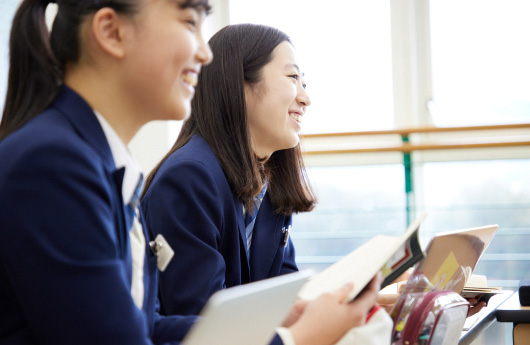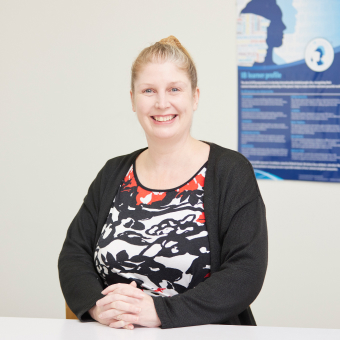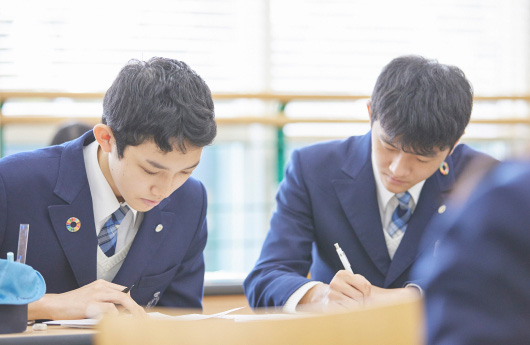From the first year of high school (G10), students pursue either the IB or TI course, proceeding to a more advanced curriculum.


The International Baccalaureate (IB) is an educational programme developed by the International Baccalaureate Organisation (IBO), headquartered in Geneva, Switzerland. This globally recognised course emphasises the acquisition of skills necessary to succeed in a rapidly globalising society. Themes include a spirit of understanding and respecting diversity, an ability to think and communicate logically and communication skills to enhance team collaboration.
The IBO offers four programmes that cater to various student ages and goals. By meeting various IBO-set requirements throughout a two-year curriculum, our students obtain the International Baccalaureate Diploma, an internationally recognised qualification for entering university.
Our school was officially approved as an International Baccalaureate World School on October 4, 2013. It was the very first Ichijou-Kou* in the Kyushu and Shikoku regions to be so certified.
*Ichijou-Kou refers to educational institutions stipulated in Article 1 of the School Education Law in Japan, and includes kindergartens, elementary schools, junior high schools, compulsory education schools, high schools, secondary schools, schools for students with special needs, universities, and technical colleges.
Throughout the IB course, students take ownership of their own learning through research activities.
For example, in a science class, students choose their specific topics of study, select the experimental methods and tools necessary for their research, make arrangements for reserving the laboratory, and manage their research timelines. By taking an active role in their own learning, students can enjoy the process more. Of course, students are welcome to consult the supervising teacher for further advice.
As, for many of our students, it is the first time that they experience this style of learning, some may encounter challenges initially. However, at our school, the IB coordinator holds regular one-on-one meetings with students, consults the teachers for each subject, and provides ongoing support to students. Given our small class sizes, this follow-up system works perfectly.
A goal of the IB programme is to develop students’ ability to ask intelligent questions and solve them strategically. To this end, the programme is designed to foster critical thinking skills, research skills, communication skills, social skills (cooperation and collaboration with others) and self-management skills (management of time and state of mind).
In fact, many of our IB course graduates have commented that the research and academic writing skills they gained at Linden Hall High School have benefited them greatly in university.
The competencies students acquire through prioritising tasks with an eye toward deadlines, managing emotions, and being flexible continue to apply after university and throughout their adult lives.
By meeting various IBO-set requirements throughout a two-year curriculum, students can acquire an International Baccalaureate Diploma (IBDP), an internationally recognised qualification for university entrance.
Students in possession of the International Baccalaureate Diploma are highly sought after by universities around the world. As of January 2021, about 100 countries and 4,500 universities have incorporated the IB into their admissions criteria. Together with our English immersion approach, the IB programme expands students’ opportunities to enroll in universities worldwide.
Within Japan as well, the MEXT is actively attempting to increase the number of IB schools in order to develop the national human resource pool capable of responding to a globalising society. More and more national, public and private universities have admissions systems that consider and value the IB.
※For more information on the use of the IB in Japanese university admissions, please refer to this page.
One of the features of the IB is CAS, which involves the following 3 elements: Creativity, Activity, and Service. Students engage in the programme outside of class hours. Over the course of two years, they consider, plan, implement, and review a number of initiatives on their own.
CAS activities may cover a wide range of topics, such as creating a website to introduce extracurricular activity possibilities to students, trying out jazz and contemporary dance, teaching online English lessons to students at a Burmese school for immigrants, and volunteering to teach ballet to 3-5 year-old children, etc. An individualised and unique approach is taken based on each student's personality and interests.
CAS encourages in students a recognition of one's strengths and challenges; persistence in starting, continuing, and accomplishing goals independently; aptitude for identifying the connections between one's own and the world's problems; the ability to communicate one's feelings and knowledge to the world; and cooperation or teamwork skills.
Students involved in the programme have commented, “I was able to think deeply about what I felt and what I learned and make use of these by reflecting after each activity,” and, “Through CAS, I got a better picture of how I want to progress in the future.”


IB Coordinator
Through the IB programme, students acquire the skills to think for themselves rather than just memorising facts. For example, in the English B class, rather than concentrating on English grammar, students watch documentaries on social issues that are particularly relevant to English-speaking countries, such as the prevalence of fast food or the increase in popularity of cosmetic surgery. Students think about what messages the documentaries are trying to convey and how the messages are being expressed (including use of bias and manipulation). Students also read novels in order to discuss their themes and styles. In these classes, it is not enough to merely understand English grammar and words, but it is also necessary to understand why people choose the words that they do and that there is always an element of intent involved when we choose our language and means of expression. We consider the background of various uses of English vocabulary and encourage digging deeper into people’s thoughts by analysing the language that they use. It is very important that students learn various ways of thinking, listen to other people's opinions, and think for themselves. Information in newspapers and books is not always correct. Students will also learn to examine other sources of information, compare information, and verify information from a panoramic perspective.
Acquiring these skills may seem very difficult at first, but as students progress through the programme, they will become more accustomed to thinking and, therefore, more able to handle the process confidently over time. With the independence of thought that they gain as high school students, they will be able to learn what they want to learn more easily and at a deeper level in university. We think that this will have great meaning and become an important asset in their future lives.

The Think and Inquire Course (TI Course) is intended for students who wish to enroll in Japanese universities. It follows domestic curricular guidelines and prepares students well for the Common Test for University Admissions in Japan. This rigorous academic course is highly suitable for students wishing to advance to national and public universities (especially science and medicine courses) and competitive private universities in Japan. It is also possible to apply to universities overseas with the TI Course, for example to universities in the United States that utilize the SAT and ACT exams.
Given the school’s English immersion approach, our students will already have acquired a sufficient English level. (By Grade 10, they would be expected to score at about 80% in English in the Common Test for University Admissions in Japan.) This gives them the advantage of being able to use the time that ordinary high school students spend tackling English, on other meaningful pursuits.
In order to succeed in the subject-specific examinations of domestic universities and the Common Test for University Admissions in Japan, students should learn each subject at a deeper level. Therefore, within the TI Course, classes other than English are conducted in Japanese.
In addition, highly experienced staff provide detailed guidance tailored to the various entrance examination methods of Japanese universities, according to the individuality and wishes of each student. We also provide elective classes that students can pick and choose depending on their academic and career pathways.
As our students would already have acquired a sufficient English level, they may use the time that ordinary high school students spend tackling English on obtaining the necessary scores on any entrance examinations that overseas universities require. Under the guidance of specialised staff, students can apply to universities in the US and other countries overseas.
For more information on our educational offerings,
please see the content below.

Loading





